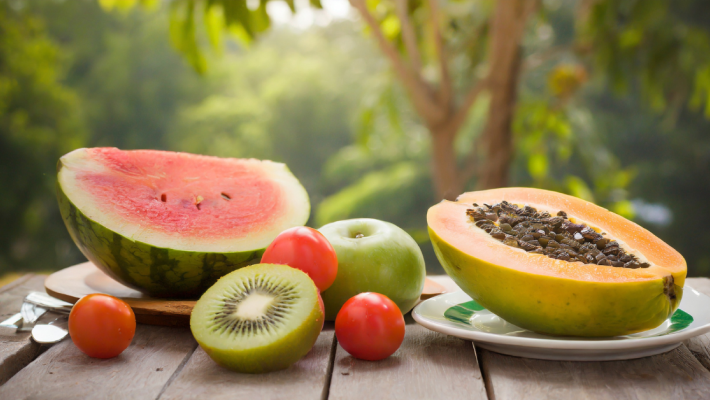Container-Friendly Fruits
- €6,95
Premium Strawberry Seeds for Large Fruit HarvestsExperience the joy of cultivating strawberry seeds from the remarkable Fragaria x ananassa Treasure F1 variety, known for producing exceptionally large fruit strawberries. These seeds yield sweet fragrant strawberries...
- €5,95
Vibrant Cherry Tomato Seeds for Sweet HarvestsDiscover the delight of growing cherry tomato seeds with the Super Sweet 100 F1 variety, known for producing abundant clusters of small, juicy fruits. These Solanum lycopersicum plants develop...
- €5,95
Compact patio sweet pepper seeds for containersBring vibrant colour to small spaces with sweet pepper seeds Redskin F1, a compact F1 hybrid developed from Capsicum annuum. This dwarf red pepper for pots forms sturdy, bushy...
- €4,95
Vibrant Sweet Yellow Horn Pepper SeedsDiscover the unique appeal of sweet yellow horn pepper seeds, featuring the striking horn-shaped fruits of Capsicum annuum L.. This productive pepper variety is known for its deliciously sweet flavor...
- €4,95
Striped Tigerella Tomatoes For Greenhouse And PatioBring striking colour to your vegetable garden with Tigerella tomato seeds. This classic variety of Solanum lycopersicum is known for its eye-catching red and green striped fruits, making it...
- €4,95
Flavorful Tomatillo Seeds for Sweet and Sour FruitsDiscover tomatillo seeds from Physalis ixocarpa, known for producing juicy, sweet and sour fruits prized in many culinary traditions. Often referred to as Mexican husk tomato, these edible...
- €4,95
Vibrant Tomato Color Mix Seeds for Salad GarnishDiscover the Tomato Color Mix Seeds, a captivating selection of heirloom tomato seeds perfect for adding a splash of color to your garden and kitchen. This colorful tomato...
- €4,95
Popular Tomato Moneymaker Seeds for Gardeners Tomato Moneymaker seeds are a favored choice among home gardening tomatoes due to their reliable performance and appealing fruit. This heirloom tomato variety produces vibrant red round tomatoes that...
- €4,95
Popular Tomato Moneymaker Seeds for Garden Fruit PlantsDiscover the classic appeal of Tomato Moneymaker seeds, a widely favored variety of Solanum lycopersicum known for producing consistently round, flavorful tomatoes. This heirloom tomato variety is ideal...
- €6,95
Mid-Early Tomato Pyros F1 Seeds for Gardeners Tomato Pyros F1 seeds offer a rewarding choice for both hobby gardening tomatoes enthusiasts and those seeking a reliable outdoor tomato variety. This mid-early cultivar produces large round...
- €4,95
Robust heirloom tomato variety for outdoor growingThe Tomato Saint Pierre is a large heirloom tomato variety prized for its sturdy growth and abundant fruit production. This Solanum lycopersicum cultivar is a classic French tomato plant...
- €4,95
Compact round fruits from reliable watermelon seedsEnjoy growing your own mini watermelons with watermelon seeds Sugar Baby, a classic compact variety of Citrullus lanatus. These Sugar Baby watermelon seeds are ideal for gardeners who want...
- €4,95
Delightful Wild Strawberry Seeds for Everbearing HarvestDiscover the joy of growing wild strawberry seeds with the Fragaria vesca Baron Von Solemacher variety. This everbearing strawberry variety produces small, sweet strawberries that are perfect for garden...
- €4,95
Compact and Everbearing Wild Strawberry SeedsDiscover the charm of wild strawberry seeds with the Fragaria vesca Baron Von Solemacher variety, a compact strawberry variety perfect for home garden strawberries enthusiasts. This everbearing wild strawberry seeds...
- €4,95
Sweet Wild Strawberry Seeds for Balcony GardeningDiscover the delight of growing wild strawberry seeds with the unique Fragaria vesca Yellow Cream variety. This cultivar stands out for its sweet strawberry fruits that offer a creamy...
- €4,95
Compact yellow cherry tomato seeds for patiosBring vibrant colour and flavour to small spaces with yellow cherry tomato seeds of the Gourmandise patio variety. This compact form of Solanum lycopersicum reaches around 30 cm in...
- €4,95
Delightful Yellow Pearshaped Tomatoes Seeds VarietyDiscover the charm of yellow pearshaped tomatoes seeds, a unique Solanum lycopersicum variety known for producing vibrant small yellow tomatoes with a distinctive pear shape. This pear-shaped tomato variety is...
- €5,95
Delicious Large Yellow Round Tomato VarietyExperience the vibrant flavor and appealing look of the yellow round tomato, botanically known as Solanum lycopersicum L.. This golden tomato fruit stands out with its large size and uniform...
- €4,95
Premium Zloty Ozarowski Tomato Seeds for Sweet FlavorDiscover the vibrant Zloty Ozarowski tomato seeds, a remarkable variety of Solanum lycopersicum known for producing fully orange-yellow beef tomatoes. This sweet beef tomato variety delivers exceptionally flavorful...
























































